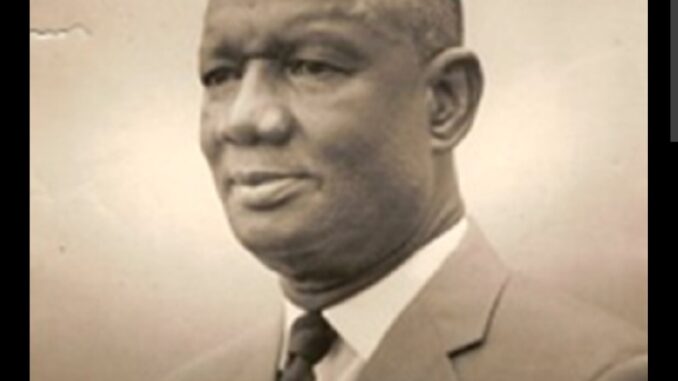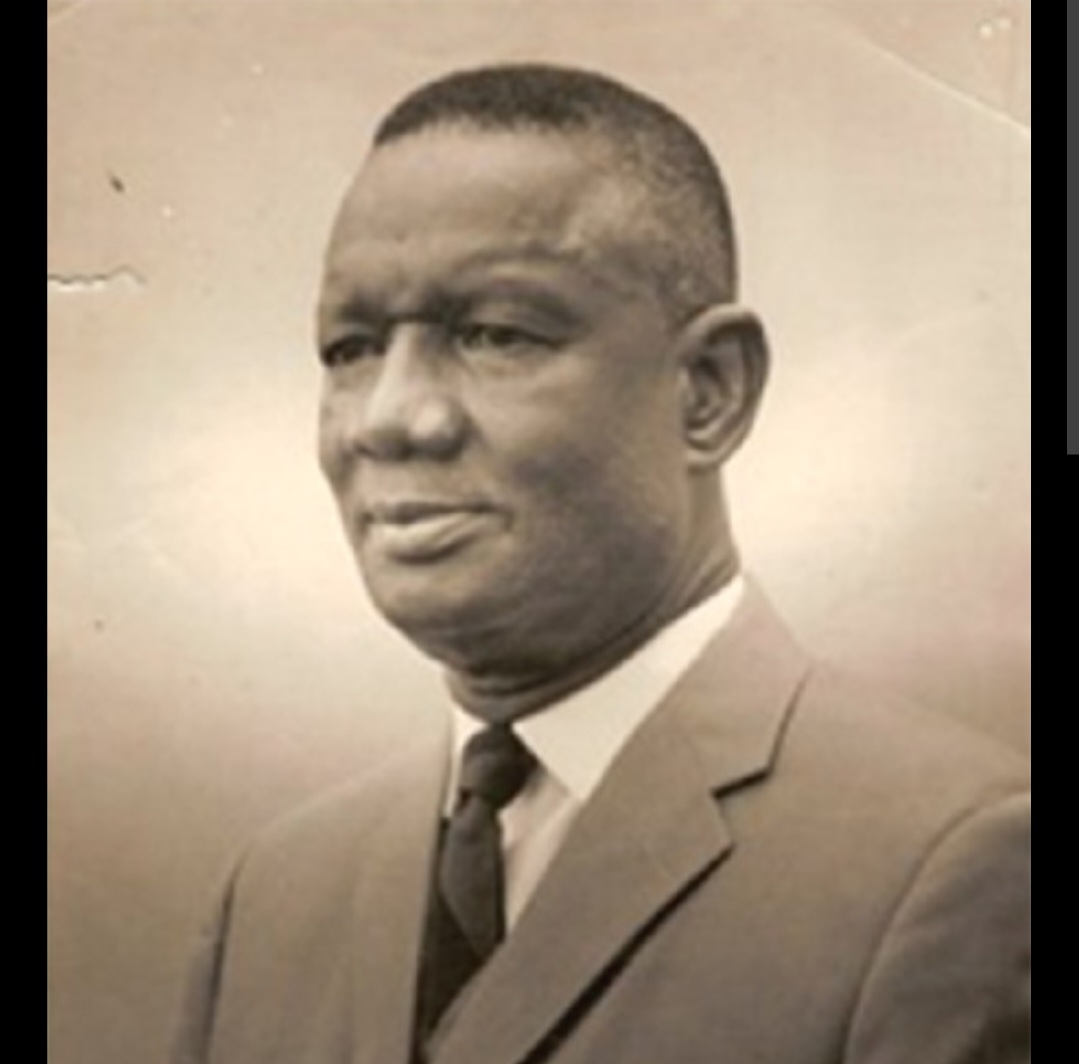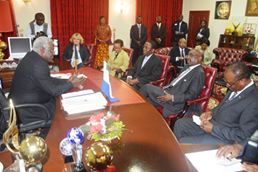
 SIAKA STEVENS TOO SHONE AT THE UN
SIAKA STEVENS TOO SHONE AT THE UN
Sierra Leone’s Unprecedented Membership Roles at the United Nations Security Council (UNSC) During The Presidency Of Siaka P Steven (1971-1972).
Sierra Leone, a small West African nation, underwent significant political and economic changes under the leadership of Siaka Stevens, who served as the country’s Prime Minister from 1967 to 1971 and as President from 1971 to 1985. Stevens’ tenure was marked by a notable international engagement and the highest level of International Influence, one of the most significant being Sierra Leone’s election to a non-permanent seat on the United Nations Security Council (UNSC) in 1970. Sierra Leone’s Election to the United Nations Security Council.
Sierra Leone, under Stevens, supported Palestinian rights and advocated for a peaceful and diplomatic resolution to the Israeli-Arab conflict. This principled stance earned Sierra Leone respect and recognition from Arab nations and other members of the Non-Aligned Movement, enhancing the country’s diplomatic influence within the African and Arab blocs at the UN. Stevens’ contributions also helped shape the discourse on the Middle East within the UNSC, reinforcing Sierra Leone’s standing among newly independent nations seeking to assert their sovereignty and influence global affairs). Decolonization efforts, and the conflict in Southern Africa, particularly about apartheid South Africa and the liberation struggles in Namibia and Rhodesia (now Zimbabwe).
The Liberation Resolutions Sierra Leone Fought For At The United Nations Security Council, Under Former President Dr. Siaka P. Steven.
Key Aspects of Stevens’ Advocacy for the Middle East
1. Support for Palestinian Rights:
Stevens, through Sierra Leone’s seat on the UNSC, supported resolutions that condemned Israeli actions in the occupied territories. He advocated for the recognition of the Palestinian Liberation Organization (PLO) as the legitimate representative of the Palestinian people, a stance that resonated with many African and Arab states.
Sierra Leone’s position was rooted in its history of colonialism and the struggle for independence, which shaped its empathy towards the Palestinian cause for self-determination.
2. Calls for a Peaceful Resolution:
Stevens consistently advocated for a peaceful and diplomatic resolution to the Israeli-Arab conflict. He urged all parties involved to adhere to international law and UNSC resolutions, such as Resolution 242, which called for the withdrawal of Israeli forces from territories occupied during the 1967 Six-Day War and the recognition of every state’s right to live in peace within secure and recognized boundaries.
During his tenure as the leader of Sierra Leone, Dr. Siaka Probyn Stevens was a vocal advocate for decolonization and the global fight against apartheid, particularly at the United Nations Security Council (UNSC). As the Prime Minister and later President of Sierra Leone, Stevens used his country’s position on the international stage to challenge colonialism and racial oppression, with a specific focus on the apartheid regime in South Africa.
Sierra Leone’s Stand Against The Then Apartheid Regime of South Africa. A Pan-Africanism Fight By Former President Dr. Siaka P Steven at the UNSC.
The apartheid regime in South Africa, which institutionalized racial segregation and discrimination against the non-white population, was a major focus of international condemnation during Stevens’ leadership. Sierra Leone, under Stevens, was resolute in its opposition to apartheid, aligning itself with other African nations and the global Non-Aligned Movement to push for the dismantling of this oppressive system.
Advocacy at the United Nations Security Council
Sierra Leone’s tenure on the United Nations Security Council from 1970 to 1971 provided Stevens with a platform to amplify his country’s stance against apartheid.
Here are some key aspects of Stevens’ advocacy against the apartheid regime at the UNSC:
1. Condemnation of Apartheid
Vocal Opposition:
Stevens’ government consistently condemned the apartheid regime in South Africa, both in statements made at the UNSC and through support for resolutions that called for international action against the South African government. Sierra Leone’s position was rooted in its commitment to the principles of human rights, equality, and justice, as well as solidarity with the oppressed peoples of South Africa.
Support for Sanctions:
Stevens advocated for economic sanctions and other punitive measures against South Africa as a means to pressure the apartheid government into dismantling its racial policies. Sierra Leone supported UNSC resolutions that called for arms embargoes and other forms of international isolation of the South African regime.
2. Support for Liberation Movements
Backing African National Congress (ANC) and Other Liberation Groups:
Sierra Leone, under Stevens, expressed strong support for the African National Congress (ANC) and other liberation movements fighting against apartheid and colonialism in Southern Africa. Stevens recognized these movements as legitimate representatives of the oppressed majority and supported their calls for self-determination and majority rule.
Diplomatic and Moral Support:
Beyond formal resolutions, Sierra Leone offered diplomatic and moral support to liberation movements. This included advocating for the release of political prisoners, such as Nelson Mandela, and highlighting the struggles of the South African people on international platforms.
3. Collaboration with the Organization of African Unity (OAU)* *African Solidarity:
Stevens was deeply involved in the Organization of African Unity (OAU), the precursor to the African Union (AU). The OAU was a key body in the continental fight against apartheid and colonialism. Sierra Leone’s stance at the UNSC was often in line with the OAU’s broader strategies, reflecting a unified African position against apartheid.
Promotion of Continental Unity:
Stevens emphasized the importance of African unity in the fight against apartheid, advocating for a collective African approach to challenging South Africa’s racial policies and supporting liberation struggles across the continent.
4. Push for International Action
Global Mobilization:
Stevens used Sierra Leone’s voice at the UNSC to call for greater international action against apartheid. He urged the global community to move beyond rhetoric and take concrete steps to isolate the apartheid regime, including the implementation of mandatory sanctions and the cessation of trade and diplomatic relations with South Africa.
Advocacy for UN Involvement:
Sierra Leone under Stevens pushed for more active involvement of the United Nations in the South African issue, including the deployment of international observers and the use of UN mechanisms to monitor and report on human rights abuses committed by the apartheid regime.
Impact of Stevens’ Advocacy
1. Strengthened African Solidarity
Stevens’ vocal stance against apartheid helped to reinforce the sense of solidarity among African nations. His leadership at the UNSC demonstrated that even smaller African nations could play a significant role in global diplomacy and the fight against racial injustice.
2. Global Pressure on the Apartheid Regime
Sierra Leone’s efforts, alongside those of other African and non-aligned nations, contributed to the mounting global pressure on South Africa. This pressure eventually played a part in the international community’s broader efforts to isolate the apartheid regime and support the liberation movements.
3. Legacy of Anti-Colonial Advocacy
Steven’s commitment to the decolonization agenda and his fight against apartheid at the UNSC left a lasting legacy.
During his tenure as the leader of Sierra Leone, Dr. Siaka Probyn Stevens was a strong advocate for the liberation of African nations still under colonial rule, particularly in Namibia and Rhodesia (now Zimbabwe). His leadership at the United Nations Security Council (UNSC) from 1970 to 197movementsld him with a platform to champion the cause of these countries’ independence and self-determination, reflecting his broader commitment to the decolonization of Africa.
Advocacy for Namibian Independence
Namibia, then known as South West Africa, was under the control of South Africa, which administered the territory as a de facto colony despite international opposition. The apartheid regime in South Africa imposed its discriminatory policies on Namibia, and the local population faced severe repression.
1. Support for SWAPO:
-Recognition of SWAPO:
Stevens and his government recognized the South West Africa People’s Organization (SWAPO) as the legitimate representative of the Namibian people. SWAPO was the main liberation movement fighting for independence from South African rule. Sierra Leone’s support for SWAPO was in line with the broader African and Non-Aligned Movement’s stance on decolonization.
Advocacy at the UNSC:
At the UNSC, Sierra Leone, under Stevens, pushed for resolutions that condemned South Africa’s illegal occupation of Namibia and called for the immediate withdrawal of South African forces from the territory. Stevens’ government advocated for international recognition of Namibia’s right to self-determination and independence, demanding that the global community take concrete steps to support the liberation struggle.
2. Condemnation of South Africa’s Policies:
Denouncing Apartheid in Namibia:
Stevens used Sierra Leone’s position on the UNSC to denounce the extension of apartheid policies to Namibia. His government highlighted the human rights abuses and economic exploitation suffered by the Namibian people under South African rule and called for global action to end these injustices.
Call for Sanctions:* Sierra Leone supported efforts to impose sanctions on South Africa as a means of pressuring the apartheid regime to relinquish its control over Namibia. Stevens was a vocal advocate for the use of international sanctions as a tool to force South Africa to comply with international law and UN resolutions.
Advocacy for the Liberation of Rhodesia (Zimbabwe)
Rhodesia, now Zimbabwe, was another focus of Stevens’ decolonization efforts. The country was under the control of a white minority government led by Ian Smith, which had unilaterally declared independence from Britain in 1965, refusing to transition to majority rule.
1. *Support for Zimbabwean Liberation Movements: Backing ZANU and ZAPU:
Stevens and his government supported the Zimbabwe African National Union (ZANU) and the Zimbabwe African People’s Union (ZAPU), the two main liberation movements fighting against the white minority regime in Rhodesia. Sierra Leone provided diplomatic backing to these groups at the UN and advocated for their recognition as the legitimate representatives of the Zimbabwean people.
Advocacy for Majority Rule
At the UNSC, Sierra Leone under Stevens consistently argued that Rhodesia’s future must be based on majority rule, a principle that was central to the broader African decolonization movement. Stevens rejected any settlement that did not guarantee full political rights to the black majority population.
2. Condemnation of the Rhodesian Regime:*
Opposition to UDI:
Stevens was a strong critic of Rhodesia’s Unilateral Declaration of Independence (UDI), which he viewed as an illegal act of defiance against the international community and a perpetuation of colonial oppression. His government called for the immediate end of the UDI and the establishment of a legitimate government based on majority rule.
Support for Sanctions:
Stevens’ Sierra Leone supported and advocated for international sanctions against the Rhodesian regime. His government pushed for comprehensive sanctions, including economic and military measures, to isolate the Rhodesian government and force it to negotiate a transition to majority rule.
Impact of Stevens’ Advocacy
1. Strengthened International Pressure:
Stevens’ efforts at the UNSC contributed to the growing international pressure on both South Africa regarding Namibia and the Rhodesian regime. His advocacy helped to keep the issues of Namibia and Zimbabwe on the global agenda, ensuring that the international community remained focused on achieving independence for these nations.
2. Support for African Unity and Solidarity:
By advocating for the liberation of Namibia and Zimbabwe, Stevens reinforced the principles of African unity and solidarity. His stance was in line with the broader objectives of the Organization of African Unity (OAU), which prioritized the liberation of all African nations from colonial and racist rule.
3. Legacy of Anti-Colonial Advocacy:
Steven’s commitment to the liberation struggles in Namibia and Zimbabwe left a lasting legacy in Sierra Leone’s foreign policy. His government’s actions during this period are remembered as a significant contribution to the broader African and global movements for decolonization, human rights, and Pan-Africanism.
Dr. Siaka Stevens’ fight for the liberation of Namibia and Rhodesia at the United Nations Security Council was a critical component of his broader foreign policy agenda focused on decolonization and African self-determination. Through his advocacy, Stevens helped to amplify the voices of liberation movements and kept the international community’s attention on the struggles for independence in these countries. His efforts not only contributed to the eventual liberation of Namibia and Zimbabwe but also reinforced Sierra Leone’s reputation as a committed supporter of African unity and justice.
During his tenure as the leader of Sierra Leone, Dr. Siaka Probyn Stevens was a prominent advocate for the principles of the Non-Aligned Movement (NAM), particularly during his country’s time on the United Nations Security Council (UNSC) from 1970 to 1971. The Non-Aligned Movement, founded during the Cold War, consisted of countries that sought to remain independent of the influence of the two superpowers, the United States and the Soviet Union, promoting peace, sovereignty, and cooperation among nations.
Sierra Leone and the Non-Aligned Movement
Sierra Leone, under Stevens, aligned itself with the NAM, which aimed to foster international cooperation and advocate for the interests of developing nations, especially in the context of decolonization and economic development. Stevens saw the NAM as a crucial platform for small and newly independent nations like Sierra Leone to assert their sovereignty and influence global affairs without being drawn into the ideological conflicts of the Cold War.
Advocacy at the United Nations Security Council
Stevens’ leadership at the UNSC provided him with a significant platform to promote the ideals of the Non-Aligned Movement. His efforts were focused on ensuring that Sierra Leone’s foreign policy remained independent and aligned with the principles of peace, self-determination, and international cooperation.
Key aspects of Stevens’ advocacy for the Non-Aligned Movement at the UNSC include:
1. Promotion of Peace and Neutrality
Advocacy for Peaceful Conflict Resolution:
Stevens used Sierra Leone’s position on the UNSC to advocate for peaceful solutions to global conflicts, in line with NAM principles. He emphasized the importance of dialogue, negotiation, and diplomacy over military interventions, reflecting the NAM’s commitment to reducing tensions and promoting global peace.
Neutrality in the Cold War:
Stevens maintained Sierra Leone’s neutrality in the Cold War, resisting pressures to align with either the Western or Eastern blocs. At the UNSC, his government consistently supported resolutions and initiatives that reflected the NAM’s stance of non-alignment, avoiding entanglement in the superpower rivalry.
2. Support for Decolonization and Self-Determination* *Championing African Liberation:
As part of the NAM, Stevens was a vocal advocate for the decolonization of Africa. At the UNSC, Sierra Leone supported resolutions calling for the end of colonial rule and the recognition of the rights of all peoples to self-determination. This was particularly evident in Stevens’ support for the liberation movements in Namibia, Rhodesia (now Zimbabwe), and South Africa.
Global Decolonization Efforts:
Beyond Africa, Stevens extended his support to other decolonization efforts worldwide, advocating for the independence of nations still under colonial rule in Asia, the Caribbean, and the Pacific. He aligned Sierra Leone’s foreign policy with the NAM’s broader goal of ending colonialism and promoting the sovereignty of all nations.
3. Economic Cooperation and Development
Advocacy for Economic Independence:
Stevens used the UNSC platform to highlight the economic challenges faced by developing nations and advocated for greater economic cooperation among NAM members. He emphasized the need for equitable global trade practices, financial aid, and technology transfer to support the economic development of newly independent countries.
Opposition to Economic Exploitation:
Stevens opposed the economic exploitation of developing countries by powerful nations and multinational corporations. He argued for a fairer global economic system that would allow developing nations to benefit more from their natural resources and labor.
4. Support for Global Disarmament
Nuclear Non-Proliferation:
In line with NAM’s emphasis on disarmament, Stevens advocated for nuclear non-proliferation and the reduction of global arms. He supported UNSC initiatives aimed at controlling the spread of nuclear weapons and promoting disarmament as a means to achieve global security.
Opposition to the Arms Race:
Stevens opposed the arms race between the superpowers, arguing that the resources spent on weapons could be better used for development and poverty alleviation in the developing world.
Impact of Stevens’ Advocacy
1. Strengthening of Non-Aligned Solidarity
Stevens’ actions at the UNSC reinforced the solidarity among NAM members, particularly in their shared goals of decolonization, peace, and economic development. His leadership helped to unify NAM members on critical global issues, ensuring that the voices of smaller nations were heard on the international stage.
2. Promotion of Sierra Leone’s International Standing
By aligning Sierra Leone with the NAM and advocating for its principles at the UNSC, Stevens elevated the country’s international standing. Sierra Leone was seen as a principled and independent voice in global affairs, contributing to its reputation as a nation committed to peace, justice, and the rights of all peoples.
3. Contribution to Global Peace and Security
Stevens’ advocacy for peaceful conflict resolution, disarmament, and decolonization contributed to broader global efforts to maintain peace and security. His emphasis on diplomacy and dialogue as tools for resolving conflicts aligned with the UNSC’s mandate to prevent and address threats to international peace.
Dr. Siaka Stevens’ promotion of the Non-Aligned Movement’s principles at the United Nations Security Council was a significant aspect of his foreign policy. His advocacy for peace, neutrality, decolonization, economic cooperation, and disarmament reflected his commitment to the ideals of the NAM and the interests of developing nations. Through his efforts, Stevens helped to strengthen the global influence of the Non-Aligned Movement and ensured that Sierra Leone played a meaningful role in the pursuit of a more just and peaceful international order.
Sierra Leone’s advocacy for peace was aligned with the broader goals of the United Nations to maintain international peace, freedom, and security.
The Impact of UNSC Membership on Sierra Leone
1. Enhanced International Prestige
Sierra Leone’s election to the UNSC enhanced its international prestige. As a small, newly independent nation, being part of one of the most powerful bodies within the United Nations elevated Sierra Leone’s status on the global stage. It allowed the country to participate in high-level diplomacy and decision-making processes that directly impacted international peace and security. This recognition bolstered Sierra Leone’s image as a responsible member of the international community.
2. Increased Influence in African Affairs
During its tenure on the UNSC, Sierra Leone leveraged its position to advocate for African interests, particularly in the context of decolonization and the fight against apartheid. Stevens and his government used the platform to voice concerns about racial injustice and the need for African self-determination. This helped Sierra Leone build stronger ties with other African nations and solidified its reputation as a leading voice for the continent in international forums.
Sierra Leone’s election to the United Nations Security Council during Siaka Stevens’ presidency was a significant milestone in the nation’s history. It elevated Sierra Leone’s international standing, strengthened its voice in African and global affairs, and provided Stevens with political importance.




Leave a Reply